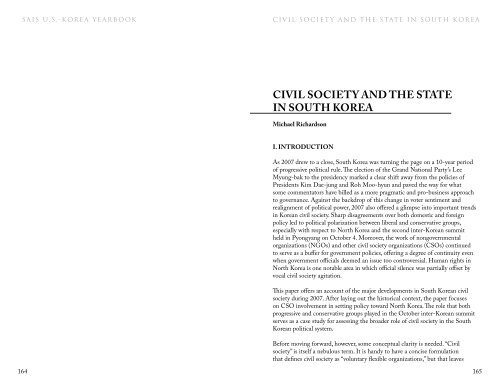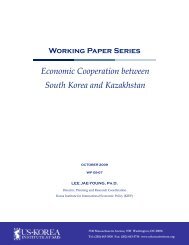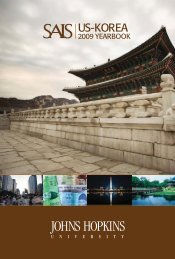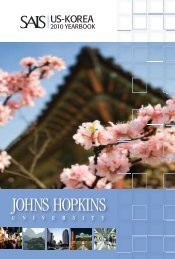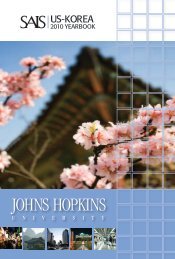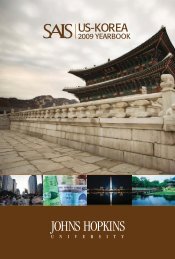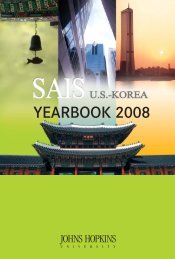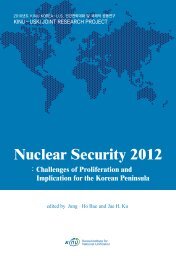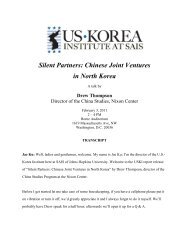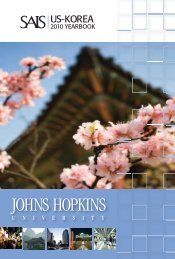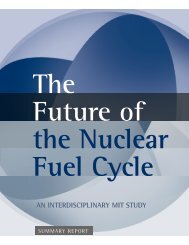Civil Society and the State in South Korea, by Michael Richardson
Civil Society and the State in South Korea, by Michael Richardson
Civil Society and the State in South Korea, by Michael Richardson
Create successful ePaper yourself
Turn your PDF publications into a flip-book with our unique Google optimized e-Paper software.
SAIS U.S.-KOREA YEARBOOK<br />
CIVIL SOCIETY AND THE STATE IN SOUTH KOREA<br />
CIVIL SOCIETY AND THE STATE<br />
IN SOUTH KOREA<br />
<strong>Michael</strong> <strong>Richardson</strong><br />
I. INTRODUCTION<br />
As 2007 drew to a close, <strong>South</strong> <strong>Korea</strong> was turn<strong>in</strong>g <strong>the</strong> page on a 10-year period<br />
of progressive political rule. The election of <strong>the</strong> Gr<strong>and</strong> National Party’s Lee<br />
Myung-bak to <strong>the</strong> presidency marked a clear shift away from <strong>the</strong> policies of<br />
Presidents Kim Dae-jung <strong>and</strong> Roh Moo-hyun <strong>and</strong> paved <strong>the</strong> way for what<br />
some commentators have billed as a more pragmatic <strong>and</strong> pro-bus<strong>in</strong>ess approach<br />
to governance. Aga<strong>in</strong>st <strong>the</strong> backdrop of this change <strong>in</strong> voter sentiment <strong>and</strong><br />
realignment of political power, 2007 also offered a glimpse <strong>in</strong>to important trends<br />
<strong>in</strong> <strong>Korea</strong>n civil society. Sharp disagreements over both domestic <strong>and</strong> foreign<br />
policy led to political polarization between liberal <strong>and</strong> conservative groups,<br />
especially with respect to North <strong>Korea</strong> <strong>and</strong> <strong>the</strong> second <strong>in</strong>ter-<strong>Korea</strong>n summit<br />
held <strong>in</strong> Pyongyang on October 4. Moreover, <strong>the</strong> work of nongovernmental<br />
organizations (NGOs) <strong>and</strong> o<strong>the</strong>r civil society organizations (CSOs) cont<strong>in</strong>ued<br />
to serve as a buffer for government policies, offer<strong>in</strong>g a degree of cont<strong>in</strong>uity even<br />
when government officials deemed an issue too controversial. Human rights <strong>in</strong><br />
North <strong>Korea</strong> is one notable area <strong>in</strong> which official silence was partially offset <strong>by</strong><br />
vocal civil society agitation.<br />
This paper offers an account of <strong>the</strong> major developments <strong>in</strong> <strong>South</strong> <strong>Korea</strong>n civil<br />
society dur<strong>in</strong>g 2007. After lay<strong>in</strong>g out <strong>the</strong> historical context, <strong>the</strong> paper focuses<br />
on CSO <strong>in</strong>volvement <strong>in</strong> sett<strong>in</strong>g policy toward North <strong>Korea</strong>. The role that both<br />
progressive <strong>and</strong> conservative groups played <strong>in</strong> <strong>the</strong> October <strong>in</strong>ter-<strong>Korea</strong>n summit<br />
serves as a case study for assess<strong>in</strong>g <strong>the</strong> broader role of civil society <strong>in</strong> <strong>the</strong> <strong>South</strong><br />
<strong>Korea</strong>n political system.<br />
Before mov<strong>in</strong>g forward, however, some conceptual clarity is needed. “<strong>Civil</strong><br />
society” is itself a nebulous term. It is h<strong>and</strong>y to have a concise formulation<br />
that def<strong>in</strong>es civil society as “voluntary flexible organizations,” but that leaves<br />
164 165
SAIS U.S.-KOREA YEARBOOK<br />
CIVIL SOCIETY AND THE STATE IN SOUTH KOREA<br />
someth<strong>in</strong>g to be desired. For <strong>the</strong> purposes of this paper, <strong>the</strong> London School of<br />
Economics <strong>Civil</strong> <strong>Society</strong> Centre’s work<strong>in</strong>g def<strong>in</strong>ition will suffice:<br />
<strong>Civil</strong> society refers to <strong>the</strong> arena of uncoerced collective action around<br />
shared <strong>in</strong>terests, purposes <strong>and</strong> values. In <strong>the</strong>ory, its <strong>in</strong>stitutional<br />
forms are dist<strong>in</strong>ct from those of <strong>the</strong> state, family <strong>and</strong> market, though<br />
<strong>in</strong> practice, <strong>the</strong> boundaries between state, civil society, family <strong>and</strong><br />
market are often complex, blurred <strong>and</strong> negotiated. <strong>Civil</strong> society<br />
commonly embraces a diversity of spaces, actors <strong>and</strong> <strong>in</strong>stitutional<br />
forms, vary<strong>in</strong>g <strong>in</strong> <strong>the</strong>ir degree of formality, autonomy <strong>and</strong> power.<br />
<strong>Civil</strong> societies are often populated <strong>by</strong> organisations such as registered<br />
charities, development non-governmental organisations, community<br />
groups, women’s organisations, faith-based organisations, professional<br />
associations, trade unions, self-help groups, social movements, bus<strong>in</strong>ess<br />
associations, coalitions <strong>and</strong> advocacy groups.<br />
The importance of civil society lies <strong>in</strong> its ability to provide a public space for <strong>the</strong><br />
<strong>in</strong>teraction of diverse societal values <strong>and</strong> <strong>in</strong>terests. As will be seen <strong>in</strong> <strong>the</strong> sections<br />
that follow, <strong>Korea</strong>n CSOs have played an active role <strong>in</strong> <strong>the</strong> past year <strong>in</strong> <strong>the</strong> public<br />
debate on a range of issues.<br />
II. HISTORY AND BACKGROUND<br />
In many ways, <strong>the</strong> growth of civil society <strong>in</strong> <strong>South</strong> <strong>Korea</strong> mirrors <strong>the</strong> growth<br />
of <strong>the</strong> nation’s economy. In <strong>the</strong> early 1960s, <strong>South</strong> <strong>Korea</strong>’s per capita GDP<br />
was lower than that of <strong>the</strong> Belgian Congo. Still recover<strong>in</strong>g from <strong>the</strong> ravages<br />
of <strong>in</strong>ternec<strong>in</strong>e war, <strong>Korea</strong> had not urbanized, <strong>and</strong> prospects for development<br />
looked bleak. Then <strong>the</strong>re followed, seem<strong>in</strong>gly out of nowhere, three decades of<br />
fantastic economic growth, dur<strong>in</strong>g which <strong>the</strong> country transformed itself from an<br />
impoverished backwater to an urban <strong>in</strong>dustrial powerhouse. By <strong>the</strong> end of <strong>the</strong><br />
20th century, <strong>South</strong> <strong>Korea</strong> boasted <strong>the</strong> 11th largest economy <strong>in</strong> <strong>the</strong> world.<br />
<strong>Civil</strong> society has emerged on <strong>the</strong> pen<strong>in</strong>sula with similar gusto. Though scholars<br />
debate <strong>the</strong> precise orig<strong>in</strong>s of civil society <strong>in</strong> <strong>Korea</strong> (some argue that it existed <strong>in</strong><br />
nascent form dur<strong>in</strong>g <strong>the</strong> Chosun dynasty, while o<strong>the</strong>rs see its birth com<strong>in</strong>g much<br />
later, dur<strong>in</strong>g <strong>the</strong> Japanese colonial era or <strong>the</strong> postwar period), <strong>the</strong>re is no doubt<br />
that organized civic groups have blossomed s<strong>in</strong>ce 1987. In that year, nationwide<br />
demonstrations forced <strong>the</strong> authoritarian Chun Doo-hwan regime to hold<br />
democratic elections <strong>and</strong> ushered <strong>in</strong> a new era of participatory politics <strong>in</strong> <strong>South</strong><br />
<strong>Korea</strong>.<br />
The years follow<strong>in</strong>g Chun’s capitulation saw an extraord<strong>in</strong>ary <strong>in</strong>crease <strong>in</strong> <strong>the</strong><br />
number <strong>and</strong> variety of <strong>South</strong> <strong>Korea</strong>’s civic groups <strong>and</strong> voluntary associations.<br />
As Hagen Koo notes <strong>in</strong> his study of <strong>Korea</strong>n civil society, <strong>the</strong>se groups “<strong>in</strong>cluded<br />
such organizations as <strong>the</strong> citizens’ coalition for economic justice, <strong>the</strong> league of<br />
anti-pollution movements, fem<strong>in</strong>ist groups, teachers’ associations for educational<br />
reform, journalists’ associations for press freedom, citizens’ watch groups for<br />
fair elections, citizen groups to fight political corruption or to fight regionalism,<br />
pressure groups for ensur<strong>in</strong>g responsive state agencies, <strong>and</strong> so forth.”<br />
A cursory glance at <strong>the</strong> civil society groups that sprouted <strong>in</strong> this period shows<br />
most of <strong>the</strong>m to be liberal, if not leftist. This should come as no surprise.<br />
Traditionally, such “liberal” <strong>in</strong>terests as press freedom, environmental protection,<br />
<strong>and</strong> women’s rights were precisely <strong>the</strong> <strong>in</strong>terests that had been ignored or<br />
suppressed dur<strong>in</strong>g <strong>South</strong> <strong>Korea</strong>’s authoritarian period. Liberalization of <strong>the</strong><br />
political sphere thus paved <strong>the</strong> way for <strong>the</strong> liberalization (<strong>and</strong>, <strong>in</strong> some sense,<br />
liberation) of civil society. The nature <strong>and</strong> composition of <strong>the</strong>se new civic<br />
organizations reflected a degree of dissatisfaction with <strong>the</strong> course of <strong>the</strong> country’s<br />
development. <strong>State</strong>-led economic growth had transformed <strong>South</strong> <strong>Korea</strong>, but it<br />
had also stymied <strong>the</strong> political <strong>and</strong> social aspirations of large segments of society.<br />
Civic groups <strong>in</strong> <strong>the</strong> 1990s sought to compensate for those decades of neglect.<br />
III. RECENT TRENDS: THE POLARIZATION OF CIVIL SOCIETY<br />
The growth of civil society cont<strong>in</strong>ued apace under <strong>the</strong> adm<strong>in</strong>istration of<br />
President Roh Moo-hyun. More than ei<strong>the</strong>r of his two democratically elected<br />
predecessors, he actively courted <strong>and</strong> supported a wide variety of civic groups.<br />
Hav<strong>in</strong>g won <strong>the</strong> 2002 election on a wave of youthful, progressive support, he<br />
proceeded to build a “participatory government” that both <strong>in</strong>creased f<strong>in</strong>ancial<br />
back<strong>in</strong>g for civic groups <strong>and</strong> encouraged direct civil society participation <strong>in</strong><br />
<strong>the</strong> policymak<strong>in</strong>g process. President Roh Moo-hyun also cont<strong>in</strong>ued former<br />
President Kim Dae-jung’s practice of <strong>in</strong>vit<strong>in</strong>g prom<strong>in</strong>ent civic group leaders<br />
to jo<strong>in</strong> his adm<strong>in</strong>istration. The consequences of this support for progressive<br />
civil society have varied. For one th<strong>in</strong>g, participation <strong>in</strong> <strong>and</strong> giv<strong>in</strong>g to voluntary<br />
organizations have <strong>in</strong>creased over <strong>the</strong> past five years. For ano<strong>the</strong>r, <strong>the</strong> onl<strong>in</strong>e<br />
“netizen” community has garnered considerable power as an <strong>in</strong>formal force for<br />
political <strong>and</strong> social change.<br />
At <strong>the</strong> same time, however, <strong>the</strong> close ties between government <strong>and</strong> civil society<br />
have provoked a conservative backlash. If <strong>the</strong> growth of progressive civic groups<br />
can be seen as a reaction to conservative, authoritarian rule, <strong>the</strong>n <strong>the</strong> growth of<br />
conservative civic groups can be seen as just <strong>the</strong> opposite: a reaction to liberal,<br />
progressive rule. The New Right NGOs <strong>and</strong> political religious groups that<br />
have recently appeared are representative of this trend. One such group, <strong>the</strong><br />
New Right Union, explicitly claims to comb<strong>in</strong>e <strong>the</strong> functions of a civil society<br />
organization <strong>and</strong> a political movement organization. Boast<strong>in</strong>g some 15,000<br />
166 167
SAIS U.S.-KOREA YEARBOOK<br />
CIVIL SOCIETY AND THE STATE IN SOUTH KOREA<br />
members, from whom it draws most of its fund<strong>in</strong>g <strong>in</strong> small donations, <strong>the</strong> group<br />
advocates <strong>the</strong> advancement of liberalism, <strong>the</strong> rule of law, <strong>and</strong> globalization. Its<br />
<strong>in</strong>augural slogan left little doubt about its goals: “To end <strong>the</strong> leftist power.”<br />
The rise of conservative groups reflects a broader issue that <strong>South</strong> <strong>Korea</strong>n civil<br />
society now faces: ideological polarization. As civic groups have become more<br />
<strong>in</strong>volved <strong>in</strong> <strong>the</strong> political sphere, <strong>the</strong>y have simultaneously experienced <strong>and</strong><br />
contributed to <strong>the</strong> problems of politicization. Bitter left-right divides are just<br />
as sharp among civil society organizations as <strong>the</strong>y are among political parties.<br />
Professor Sh<strong>in</strong> Kwang-young of Chung-Ang University argues that this<br />
polarization has far-reach<strong>in</strong>g negative consequences. “Such politically motivated<br />
activities <strong>by</strong> civic groups have resulted <strong>in</strong> public disapproval,” he told <strong>the</strong> <strong>Korea</strong><br />
Herald, “weaken<strong>in</strong>g <strong>the</strong> very basis of <strong>the</strong> entire civil society.”<br />
Never<strong>the</strong>less, it would not seem that <strong>the</strong> politicization of some civil society<br />
sectors has dim<strong>in</strong>ished <strong>South</strong> <strong>Korea</strong>n society’s overall capacity for collective<br />
action. The response to a disastrous oil spill on December 7, 2007, which left a<br />
40-kilometer swath of <strong>Korea</strong>’s western coastl<strong>in</strong>e soaked <strong>in</strong> petroleum, has been<br />
tell<strong>in</strong>g. Environmental NGOs have worked toge<strong>the</strong>r with <strong>the</strong> government <strong>and</strong><br />
ord<strong>in</strong>ary citizens to organize a massive clean-up campaign. As of December 28,<br />
more than 300,000 volunteers from across <strong>the</strong> country had trekked to Anmyeondo<br />
<strong>and</strong> o<strong>the</strong>r devastated coastal areas to help with <strong>the</strong> relief effort. Press reports<br />
<strong>and</strong> conversations with ord<strong>in</strong>ary <strong>Korea</strong>ns revealed a widely felt sense of collective<br />
responsibility for provid<strong>in</strong>g help <strong>in</strong> <strong>the</strong> wake of this environmental tragedy.<br />
IV. CIVIL SOCIETY AND THE POLICY TOWARD NORTH KOREA<br />
Yet a central fact rema<strong>in</strong>s: although a disaster may br<strong>in</strong>g <strong>South</strong> <strong>Korea</strong>n civil<br />
society groups toge<strong>the</strong>r, many o<strong>the</strong>r issues drive <strong>the</strong>m apart. Policy toward<br />
North <strong>Korea</strong> has long provided grist for political division <strong>in</strong> <strong>the</strong> <strong>South</strong>, <strong>and</strong> civil<br />
society reflects this ideological chasm. On <strong>the</strong> left, NGOs have united around<br />
<strong>the</strong> Sunsh<strong>in</strong>e Policy (launched under President Kim Dae-jung <strong>and</strong> cont<strong>in</strong>ued<br />
<strong>by</strong> President Roh Moo-hyun) of reconciliation, cooperation, <strong>and</strong> aid. The <strong>Korea</strong><br />
NGO Council for Cooperation with North <strong>Korea</strong>, for example, has brought<br />
toge<strong>the</strong>r 60 separate NGOs under its tent. And on <strong>the</strong> right, civic <strong>and</strong> political<br />
groups have ardently taken up <strong>the</strong> cause of North <strong>Korea</strong>n human rights, a<br />
position that anchors <strong>the</strong> hard-l<strong>in</strong>e stance <strong>the</strong>y take toward Pyongyang.<br />
Responses to moments of both crisis <strong>and</strong> cooperation reveal <strong>the</strong> depth of <strong>the</strong><br />
divide between progressive <strong>and</strong> conservative groups. One low po<strong>in</strong>t came<br />
on July 4, 2006, when <strong>the</strong> regime of Kim Jong Il, Chairman of <strong>the</strong> National<br />
Defense Commission of North <strong>Korea</strong>, launched several ballistic missiles without<br />
provid<strong>in</strong>g any forewarn<strong>in</strong>g to Ch<strong>in</strong>a or <strong>South</strong> <strong>Korea</strong>. In <strong>the</strong> aftermath of <strong>the</strong><br />
launch, <strong>the</strong> People’s Solidarity for Participatory Democracy (PSPD), <strong>the</strong> <strong>Korea</strong><br />
Youth Corps (KYC), Peace Network, Women Mak<strong>in</strong>g Peace, YMCA, <strong>Korea</strong>n<br />
Federation of Environmental Movements (KFEM), Green <strong>Korea</strong>, <strong>and</strong> <strong>Korea</strong><br />
Women’s Associations United (KWAU) released <strong>the</strong> follow<strong>in</strong>g jo<strong>in</strong>t statement:<br />
We express regret that, despite concerns from <strong>South</strong> <strong>Korea</strong> <strong>and</strong> <strong>the</strong><br />
<strong>in</strong>ternational community, North <strong>Korea</strong> proceeded with missile tests.<br />
...The missile launches were an unwise action which raised <strong>the</strong> security<br />
stakes on <strong>the</strong> <strong>Korea</strong>n Pen<strong>in</strong>sula while also <strong>in</strong>creas<strong>in</strong>g <strong>the</strong> leverage of<br />
hawks <strong>in</strong> Wash<strong>in</strong>gton <strong>and</strong> Tokyo. ...<br />
We are also deeply worried about <strong>the</strong> adoption of a hard-l<strong>in</strong>e response,<br />
both domestically <strong>and</strong> <strong>in</strong>ternationally, towards North <strong>Korea</strong>. President<br />
Bush ceased negotiations regard<strong>in</strong>g North <strong>Korea</strong>’s missiles as soon as he<br />
took office. ...<br />
We also f<strong>in</strong>d it problematic that domestic politics <strong>and</strong> <strong>the</strong> media<br />
def<strong>in</strong>e <strong>the</strong> North <strong>Korea</strong>n missile launches as a failure of <strong>South</strong> <strong>Korea</strong>’s<br />
“engagement policy” <strong>and</strong> <strong>in</strong>itiate a hard-l<strong>in</strong>e approach toward <strong>the</strong> North.<br />
The current North <strong>Korea</strong>n missile launch crisis is <strong>the</strong> result of <strong>the</strong> U.S.<br />
government’s hard-l<strong>in</strong>e policy <strong>and</strong> North <strong>Korea</strong>’s improper response to it.<br />
In contrast to this measured response, <strong>in</strong> which every party <strong>in</strong> <strong>the</strong> conflict comes<br />
<strong>in</strong> for some cautious criticism, conservative groups were quick to take a hard-l<strong>in</strong>e<br />
stance aga<strong>in</strong>st North <strong>Korea</strong> <strong>and</strong> <strong>the</strong> Roh Moo-hyun adm<strong>in</strong>istration. They seized<br />
<strong>the</strong> opportunity to declare <strong>the</strong> so-called Sunsh<strong>in</strong>e Policy of rapprochement with<br />
<strong>the</strong> North a failure <strong>and</strong> to dem<strong>and</strong> a thorough revamp<strong>in</strong>g of policy toward North<br />
<strong>Korea</strong> <strong>and</strong> a streng<strong>the</strong>n<strong>in</strong>g of ties with <strong>the</strong> United <strong>State</strong>s.<br />
This is not to say that a left-right divide pervades all of civil society, however.<br />
Indeed, such a facile bifurcation obscures <strong>the</strong> fact that many civil society groups<br />
are driven <strong>by</strong> issues, not <strong>by</strong> a broader political agenda. When <strong>in</strong>terests clash,<br />
CSOs have not hesitated to turn on politicians who ostensibly share <strong>the</strong> same<br />
ideological perspective.<br />
Indeed, <strong>the</strong> polarization of civil society has spurred opposition to President Roh<br />
Moo-hyun not only from <strong>the</strong> right but also from his erstwhile allies on <strong>the</strong> left. In<br />
late 2006, <strong>the</strong> loom<strong>in</strong>g prospect of a <strong>Korea</strong>-U.S. Free Trade Agreement mobilized<br />
opposition across <strong>the</strong> country. Protests <strong>in</strong> 13 cities <strong>by</strong> more than 70,000 farmers,<br />
workers, <strong>and</strong> activists left 63 people <strong>in</strong>jured <strong>and</strong> caused an estimated 670 million<br />
won ($720,000) <strong>in</strong> property damages. In <strong>the</strong> follow<strong>in</strong>g days, police raided <strong>the</strong><br />
regional offices of <strong>the</strong> <strong>Korea</strong> Alliance Aga<strong>in</strong>st <strong>the</strong> <strong>Korea</strong>-U.S. FTA, a coalition of<br />
168 169
SAIS U.S.-KOREA YEARBOOK<br />
CIVIL SOCIETY AND THE STATE IN SOUTH KOREA<br />
about 300 civic groups responsible for lead<strong>in</strong>g <strong>the</strong> violent protests. Ironically, <strong>the</strong>se<br />
groups had received much of <strong>the</strong>ir fund<strong>in</strong>g from none o<strong>the</strong>r than <strong>the</strong> government<br />
itself. Through annual budget allocations to civic organizations, <strong>the</strong> adm<strong>in</strong>istration<br />
had effectively paid for <strong>the</strong> protests <strong>and</strong> <strong>the</strong>n paid aga<strong>in</strong> to put <strong>the</strong>m down.<br />
Largely <strong>in</strong> response to <strong>the</strong>se events, <strong>the</strong> government <strong>and</strong> <strong>the</strong> National Assembly<br />
took steps <strong>in</strong> January 2007 to cut subsidies to groups that hold violent rallies.<br />
The assembly approved 10 billion won <strong>in</strong> civic group support, as it had <strong>in</strong> years<br />
past, but also required <strong>the</strong> government to post on <strong>the</strong> Internet a list of groups<br />
that asked for subsidies, as well as <strong>the</strong> amount of fund<strong>in</strong>g each group received.<br />
Those groups l<strong>in</strong>ked to violent or destructive protests would be denied fur<strong>the</strong>r<br />
subsidies.<br />
An additional consequence of political polarization is that it colors even those<br />
CSOs that may wish to stay above <strong>the</strong> fray. Hakm<strong>in</strong> Kim of <strong>the</strong> Citizens’<br />
Alliance for North <strong>Korea</strong>n Human Rights (NKHR), for example, compla<strong>in</strong>s<br />
that <strong>the</strong> NGO for which she works has been unfairly caught up <strong>in</strong> <strong>South</strong><br />
<strong>Korea</strong>’s partisan battles. “Our organization is very nonpolitical,” she said <strong>in</strong> an<br />
<strong>in</strong>terview, “but whenever people hear ‘North <strong>Korea</strong>n human rights,’ <strong>the</strong>y th<strong>in</strong>k<br />
‘conservative.’” NKHR’s position, accord<strong>in</strong>g to Kim, is that reunification cannot<br />
be achieved without some improvement <strong>in</strong> <strong>the</strong> North <strong>Korea</strong>n human rights<br />
situation. To that end, <strong>the</strong> organization is work<strong>in</strong>g to align with governments<br />
that have diplomatic relations with North <strong>Korea</strong> <strong>and</strong> to organize <strong>in</strong>ternational<br />
conferences (<strong>the</strong> most recent of which was held <strong>in</strong> London on January 22, 2008)<br />
that call attention to NKHR’s cause.<br />
The case of NKHR reveals <strong>the</strong> difficulty civil society groups face <strong>in</strong> ma<strong>in</strong>ta<strong>in</strong><strong>in</strong>g<br />
political <strong>in</strong>dependence while simultaneously promot<strong>in</strong>g policy change.<br />
Ultimately, policy change requires elite support. If a given policy has back<strong>in</strong>g<br />
from only <strong>the</strong> elites of one political stripe, <strong>the</strong>n some degree of <strong>in</strong>terest<br />
alignment between politicians <strong>and</strong> civil society groups—<strong>and</strong> thus politicization,<br />
whe<strong>the</strong>r real or perceived—is difficult to avoid.<br />
V. AVENUES OF POWER: CSOs IN THE KOREAN POLITICAL SYSTEM<br />
The task of ga<strong>in</strong><strong>in</strong>g elite support, of course, can often be a difficult one. CSOs<br />
use a variety of tactics to get <strong>the</strong>ir messages out <strong>and</strong> <strong>the</strong>ir pet policies passed <strong>in</strong>to<br />
law. These methods can <strong>in</strong>clude direct contact with government officials, th<strong>in</strong>k<br />
tank conferences, media campaigns, <strong>and</strong> street-level demonstrations. Ultimately,<br />
however, <strong>the</strong> success of <strong>the</strong>se efforts depends on <strong>the</strong> political environment <strong>in</strong><br />
which <strong>the</strong>y are undertaken.<br />
In a forthcom<strong>in</strong>g study of anti-base movements <strong>in</strong> <strong>South</strong> <strong>Korea</strong>, Andrew Yeo<br />
describes <strong>the</strong> polarization between progressive <strong>and</strong> conservative groups, with<br />
<strong>the</strong> younger generation of <strong>Korea</strong>ns hold<strong>in</strong>g particularly negative views toward<br />
<strong>the</strong> presence of U.S. bases on <strong>the</strong> pen<strong>in</strong>sula. Yet, despite this diversity of views,<br />
<strong>the</strong>re persists a strong elite security consensus that favors react<strong>in</strong>g to U.S. policy<br />
toward North <strong>Korea</strong> ra<strong>the</strong>r than <strong>in</strong>itiat<strong>in</strong>g changes <strong>in</strong> <strong>the</strong> U.S.-<strong>Korea</strong> alliance.<br />
“The progressive Uri Party has achieved some success <strong>in</strong> mov<strong>in</strong>g <strong>the</strong> alliance<br />
towards a more equal partnership,” says Yeo, “particularly <strong>in</strong> <strong>the</strong> area of wartime<br />
operational control. Yet <strong>the</strong>re are limits to what <strong>the</strong> liberal party can achieve.<br />
<strong>South</strong> <strong>Korea</strong>’s foreign policy apparatus is still heavily <strong>in</strong>fluenced <strong>by</strong> a conservative<br />
l<strong>in</strong>e of th<strong>in</strong>k<strong>in</strong>g, <strong>and</strong> an elite consensus cont<strong>in</strong>ues to operate on issues perta<strong>in</strong><strong>in</strong>g<br />
to U.S.-<strong>South</strong> <strong>Korea</strong>n security relations.” Accord<strong>in</strong>g to Yeo’s analysis, <strong>the</strong><br />
presence of this security consensus—which itself is driven <strong>by</strong> entrenched<br />
political <strong>and</strong> ideological structures—makes it difficult for <strong>the</strong> alternative voices<br />
of progressives <strong>and</strong> radicals to ga<strong>in</strong> traction <strong>in</strong> foreign policy circles. Thus, while<br />
many activists expected Blue House <strong>and</strong> National Assembly officials <strong>in</strong> <strong>the</strong> Kim<br />
Dae-jung <strong>and</strong> Roh Moo-hyun adm<strong>in</strong>istrations to depart from what <strong>the</strong>y saw as<br />
psychological dependence on <strong>the</strong> U.S., <strong>the</strong>y were often disappo<strong>in</strong>ted to see <strong>the</strong>se<br />
formerly radical politicians moderate <strong>the</strong>ir views once <strong>in</strong> power.<br />
Yeo’s work on anti-base movements suggests that <strong>the</strong>re are clear limits to what<br />
CSOs can achieve <strong>in</strong> <strong>the</strong> <strong>South</strong> <strong>Korea</strong>n political system. Their effectiveness<br />
depends not only on citizen support <strong>and</strong> close ties to elites but also on structural<br />
factors that shape <strong>the</strong> elite consensus on a given issue. If <strong>the</strong> elite consensus is<br />
strong, CSOs promot<strong>in</strong>g alternative policies will face a rough road ahead. If <strong>the</strong><br />
consensus is weak, <strong>the</strong>y may f<strong>in</strong>d more open<strong>in</strong>gs for change.<br />
What, <strong>the</strong>n, can be said about <strong>the</strong> role of CSOs <strong>in</strong> one of <strong>the</strong> most significant<br />
foreign policy events of 2007, <strong>the</strong> October summit between President Roh<br />
Moo-hyun <strong>and</strong> Chairman Kim Jong Il The follow<strong>in</strong>g sections will outl<strong>in</strong>e <strong>the</strong><br />
ways <strong>in</strong> which <strong>South</strong> <strong>Korea</strong>n civil society groups sought to affect both <strong>the</strong> public<br />
perceptions <strong>and</strong> <strong>the</strong> substantive outcomes of this event.<br />
VI. CIVIL SOCIETY AND THE 2007 INTER-KOREAN SUMMIT<br />
As noted above, crises <strong>in</strong> <strong>in</strong>ter-<strong>Korea</strong>n relations often expose <strong>the</strong> ideological<br />
divisions <strong>in</strong> <strong>South</strong> <strong>Korea</strong>. But <strong>the</strong> reactions of CSOs to apparently positive<br />
developments <strong>in</strong> North-<strong>South</strong> relations have been no less polarized. Whereas<br />
2006 was a turbulent year, punctuated <strong>by</strong> North <strong>Korea</strong>n missile launches <strong>and</strong> an<br />
underground nuclear test, 2007 was a year characterized <strong>by</strong> a marked relaxation<br />
of tensions on <strong>the</strong> pen<strong>in</strong>sula. In addition to improvements <strong>in</strong> relations between<br />
Pyongyang <strong>and</strong> Seoul, a series of meet<strong>in</strong>gs <strong>and</strong> negotiations between North<br />
170 171
SAIS U.S.-KOREA YEARBOOK<br />
CIVIL SOCIETY AND THE STATE IN SOUTH KOREA<br />
<strong>Korea</strong> <strong>and</strong> <strong>the</strong> United <strong>State</strong>s led to progress toward peace <strong>and</strong> a North <strong>Korea</strong>n<br />
agreement to dismantle its nuclear weapons program. And yet, <strong>the</strong> ideological<br />
gap among CSOs showed no sign of clos<strong>in</strong>g.<br />
The October summit was <strong>the</strong> first such event s<strong>in</strong>ce former President Kim Daejung’s<br />
historic trip to Pyongyang <strong>in</strong> 2000. In <strong>the</strong> days <strong>and</strong> weeks before President<br />
Roh Moo-hyun followed <strong>in</strong> his predecessor’s footsteps to meet with Kim Jong Il,<br />
progressive organizations welcomed <strong>the</strong> summit as an opportunity to boost peace<br />
on <strong>the</strong> pen<strong>in</strong>sula. The <strong>Civil</strong> <strong>Society</strong> Organizations Network <strong>in</strong> <strong>Korea</strong>, an umbrella<br />
coalition of 189 civic groups, emphasized <strong>the</strong> need for economic <strong>and</strong> military<br />
cooperation between North <strong>and</strong> <strong>South</strong> <strong>and</strong> urged <strong>the</strong> <strong>South</strong> <strong>Korea</strong>n government<br />
to abolish “outdated laws <strong>and</strong> systems made dur<strong>in</strong>g <strong>the</strong> cold-war era.”<br />
Conservative civic groups, on <strong>the</strong> o<strong>the</strong>r h<strong>and</strong>, saw summitry as a political power<br />
play. Accord<strong>in</strong>g to <strong>the</strong>se organizations, President Roh Moo-hyun was us<strong>in</strong>g<br />
his visit to Pyongyang as a tool to bolster progressive political c<strong>and</strong>idates <strong>in</strong><br />
<strong>the</strong> lead-up to December’s presidential election. Park Sang-hak, head of <strong>the</strong><br />
Democracy Network Aga<strong>in</strong>st NK Gulag, argued that <strong>the</strong> summit’s agenda<br />
did not reflect public op<strong>in</strong>ion <strong>in</strong> <strong>the</strong> <strong>South</strong>. “What <strong>South</strong> <strong>Korea</strong>ns want is<br />
denuclearization of <strong>the</strong> <strong>Korea</strong>n Pen<strong>in</strong>sula,” he told <strong>the</strong> <strong>Korea</strong> Times, “<strong>and</strong> it is<br />
what Roh <strong>and</strong> Kim should talk about. But Roh said he would not irritate Kim <strong>by</strong><br />
urg<strong>in</strong>g him to scrap <strong>the</strong> nuclear program.”<br />
VII. POLITICAL ELITES: SHAPING THE SUMMIT AGENDA<br />
While CSOs dug <strong>in</strong> <strong>the</strong>ir heels <strong>and</strong> released statements to <strong>the</strong> media, political<br />
elites were reticent about <strong>the</strong> details of <strong>the</strong>ir plan for <strong>the</strong> upcom<strong>in</strong>g talks.<br />
President Roh Moo-hyun had clear personal <strong>and</strong> political reasons for pursu<strong>in</strong>g<br />
a meet<strong>in</strong>g with Kim Jong Il. A fruitful summit would not only validate his<br />
five years of work <strong>in</strong> build<strong>in</strong>g constructive ties with <strong>the</strong> North, it would also<br />
culm<strong>in</strong>ate a lifetime spent battl<strong>in</strong>g a political system that he viewed as needlessly<br />
hostile toward Pyongyang. Moreover, it would lend support to President Roh<br />
Moo-hyun’s would-be successors, thus preserv<strong>in</strong>g policy cont<strong>in</strong>uity <strong>in</strong> <strong>the</strong> next<br />
adm<strong>in</strong>istration. Even if a more conservative president were to take office <strong>in</strong> 2008,<br />
agreements reached at <strong>the</strong> summit could constra<strong>in</strong> a new government’s ability to<br />
radically alter its stance toward North <strong>Korea</strong>.<br />
The agenda itself, however, was kept secret before President Roh Moo-hyun’s<br />
departure. When Seoul announced plans on August 8 for a summit to be held<br />
later that month, it offered only a broad sketch of <strong>the</strong> issues to be discussed <strong>by</strong><br />
Roh Moo-hyun <strong>and</strong> Kim Jong Il. The government’s official statement issued<br />
that day said, “The two leaders’ discussions on a <strong>Korea</strong>n Pen<strong>in</strong>sula peace treaty<br />
will help widen bilateral military trust <strong>and</strong> fur<strong>the</strong>r upgrade mutual economic<br />
cooperation <strong>and</strong> exchanges.” Officials also expressed <strong>the</strong>ir desire to cont<strong>in</strong>ue<br />
<strong>the</strong> progress made <strong>by</strong> former President Kim Dae-jung at <strong>the</strong> first <strong>in</strong>ter-<strong>Korea</strong>n<br />
summit, but specific agenda items were left vague. In response to questions from<br />
reporters, Unification M<strong>in</strong>ister Lee Jae-jeong said that while <strong>the</strong> establishment<br />
of a <strong>Korea</strong>n peace regime would likely be considered, <strong>the</strong> details of o<strong>the</strong>r<br />
discussion po<strong>in</strong>ts rema<strong>in</strong>ed to be hashed out <strong>in</strong> <strong>the</strong> com<strong>in</strong>g weeks.<br />
Ten days after that announcement, <strong>the</strong> summit’s August 28–30 time frame was<br />
pushed back more than a month, ostensibly because of severe flood<strong>in</strong>g <strong>in</strong> <strong>the</strong><br />
North. The delay did noth<strong>in</strong>g to help clarify <strong>the</strong> planned agenda; <strong>in</strong>deed, it only<br />
left more time for speculation.<br />
Of paramount importance to political <strong>and</strong> civil society groups on both sides<br />
of <strong>the</strong> aisle was <strong>the</strong> question of North <strong>Korea</strong>n denuclearization. Speak<strong>in</strong>g <strong>in</strong><br />
Wash<strong>in</strong>gton, DC, <strong>in</strong> mid-September, former President Kim Dae-jung clearly<br />
stated that dismantlement of <strong>the</strong> North’s nuclear facilities was a necessary step<br />
toward permanent peace on <strong>the</strong> pen<strong>in</strong>sula. He said that President Roh Moohyun<br />
would def<strong>in</strong>itely raise <strong>the</strong> issue of denuclearization at <strong>the</strong> October summit.<br />
But <strong>the</strong> president seemed to have o<strong>the</strong>r plans. In <strong>the</strong> lead-up to <strong>the</strong> talks, he<br />
was reported to have said that, s<strong>in</strong>ce many o<strong>the</strong>rs were already talk<strong>in</strong>g about<br />
denuclearization, he saw no reason to risk ru<strong>in</strong><strong>in</strong>g <strong>the</strong> atmosphere of <strong>the</strong> talks <strong>by</strong><br />
rais<strong>in</strong>g such a contentious issue.<br />
VIII. CIVIL SOCIETY AS A “THIRD PARTY”<br />
In <strong>the</strong> end, <strong>the</strong> outcome of <strong>the</strong> summit surprised many observers. In addition<br />
to pledg<strong>in</strong>g to cont<strong>in</strong>ue to implement <strong>the</strong> agreement signed at <strong>the</strong> June 15,<br />
2000, <strong>in</strong>ter-<strong>Korea</strong>n summit, North <strong>and</strong> <strong>South</strong> <strong>Korea</strong> agreed on several new<br />
cooperative measures. These <strong>in</strong>clude <strong>the</strong> development of a “special peace <strong>and</strong><br />
cooperation zone <strong>in</strong> <strong>the</strong> West Sea [Yellow Sea]”; <strong>the</strong> completion of “<strong>the</strong> firstphase<br />
construction of <strong>the</strong> Kaesong Industrial Complex at an early date <strong>and</strong><br />
[<strong>the</strong> commencement of ] <strong>the</strong> second-stage development project”; <strong>and</strong> a mutual<br />
recognition of “<strong>the</strong> need to end <strong>the</strong> current armistice regime <strong>and</strong> build a<br />
permanent peace regime” on <strong>the</strong> pen<strong>in</strong>sula. Notably absent from <strong>the</strong> October 4,<br />
2007, jo<strong>in</strong>t statement was any concrete mention of denuclearization or human<br />
rights issues.<br />
Conservative groups were predictably vexed. In <strong>the</strong> aftermath of <strong>the</strong> summit,<br />
<strong>the</strong>y ramped up <strong>the</strong>ir criticisms of President Roh Moo-hyun <strong>and</strong> began<br />
jockey<strong>in</strong>g for <strong>in</strong>fluence <strong>in</strong> <strong>the</strong> run-up to December’s presidential elections.<br />
On November 6, an alliance of organizations associated with <strong>the</strong> New<br />
172 173
SAIS U.S.-KOREA YEARBOOK<br />
CIVIL SOCIETY AND THE STATE IN SOUTH KOREA<br />
Right Movement set forth comprehensive recommendations for <strong>the</strong> next<br />
adm<strong>in</strong>istration’s North <strong>Korea</strong> policy. Members of <strong>the</strong> New Right Policy<br />
Committee, Citizens United for Better <strong>Society</strong>, Lawyers for Citizens, Liberty<br />
Union, <strong>and</strong> Hansun Foundation for Freedom <strong>and</strong> Prosperity jo<strong>in</strong>tly condemned<br />
<strong>the</strong> Sunsh<strong>in</strong>e Policy of Presidents Kim Dae-jung <strong>and</strong> Roh Moo-hyun. They<br />
criticized <strong>the</strong> policy for, among o<strong>the</strong>r th<strong>in</strong>gs, fail<strong>in</strong>g to produce North <strong>Korea</strong>n<br />
political reform, fail<strong>in</strong>g to open <strong>the</strong> North <strong>Korea</strong>n economy, <strong>and</strong> fail<strong>in</strong>g to<br />
address North <strong>Korea</strong>’s human rights situation. The ma<strong>in</strong> causes of <strong>the</strong> policy’s<br />
failure, <strong>the</strong>y argued, were its overoptimism <strong>and</strong> overreliance on one-way<br />
economic assistance.<br />
In <strong>the</strong> Sunsh<strong>in</strong>e Policy’s stead, <strong>the</strong> New Right groups proposed <strong>the</strong><br />
streng<strong>the</strong>n<strong>in</strong>g of <strong>in</strong>ternational cooperation based on an alliance among <strong>South</strong><br />
<strong>Korea</strong>, <strong>the</strong> United <strong>State</strong>s, <strong>and</strong> Japan. Ra<strong>the</strong>r than provide one-way assistance,<br />
Seoul would participate <strong>in</strong> an <strong>in</strong>ternational consortium to develop <strong>the</strong> North’s<br />
economy. It would actively encourage <strong>in</strong>ternal reform, assist <strong>in</strong> organiz<strong>in</strong>g<br />
domestic <strong>and</strong> <strong>in</strong>ternational reform-focused groups, <strong>and</strong>, significantly, require as a<br />
prerequisite <strong>the</strong> complete denuclearization of <strong>the</strong> <strong>Korea</strong>n pen<strong>in</strong>sula.<br />
As <strong>the</strong> conservative sectors of <strong>South</strong> <strong>Korea</strong>n society were well aware, <strong>the</strong><br />
October summit’s outcome (as well as <strong>the</strong> fact that it was held at all) reflected<br />
<strong>the</strong> general policy preferences of <strong>South</strong> <strong>Korea</strong>’s progressive politicians <strong>and</strong><br />
CSOs. Yet <strong>the</strong>re is little available evidence that demonstrates <strong>the</strong> precise<br />
ways <strong>in</strong> which CSOs failed or succeeded <strong>in</strong> <strong>in</strong>fluenc<strong>in</strong>g <strong>the</strong> summit’s agenda.<br />
Did President Roh Moo-hyun raise (or not raise, as <strong>the</strong> case may be) certa<strong>in</strong><br />
agenda items because of civil society pressure, or because of unrelated personal<br />
or political reasons Does <strong>the</strong> jo<strong>in</strong>t statement reflect <strong>South</strong> <strong>Korea</strong>n dem<strong>and</strong>s<br />
<strong>and</strong> North <strong>Korea</strong>n concessions, or vice versa These questions may never be<br />
completely answered.<br />
It does seem clear, however, that once <strong>the</strong> parties from North <strong>and</strong> <strong>South</strong> <strong>Korea</strong><br />
met <strong>in</strong> Pyongyang, <strong>the</strong>re was little time for CSOs to exert any real <strong>in</strong>fluence over<br />
<strong>the</strong> outcome of <strong>the</strong> summit. Accord<strong>in</strong>g to one summit participant on <strong>the</strong> <strong>South</strong><br />
<strong>Korea</strong>n side who was <strong>in</strong>terviewed for this paper, substantive <strong>in</strong>teraction with<br />
North <strong>Korea</strong>n officials proved difficult. Meet<strong>in</strong>gs of delegate subcommittees<br />
(held separately from <strong>the</strong> ma<strong>in</strong> talks between President Roh Moo-hyun <strong>and</strong><br />
Chairman Kim Jong Il) were limited to one hour, <strong>and</strong> North <strong>Korea</strong>n officials had<br />
no freedom to deviate from <strong>the</strong> North <strong>Korea</strong>n Workers’ Party l<strong>in</strong>e. Moreover,<br />
while <strong>South</strong> <strong>Korea</strong> sent a delegation of <strong>in</strong>dependent civil society representatives<br />
<strong>and</strong> academics to <strong>the</strong> October summit, North <strong>Korea</strong> sent counterparts who<br />
had been organized <strong>and</strong> effectively “corporatized” <strong>by</strong> Kim Jong Il’s regime <strong>in</strong><br />
Pyongyang.<br />
Even if academics <strong>and</strong> CSO representatives were limited <strong>in</strong> <strong>the</strong>ir ability to sway<br />
events at <strong>the</strong> October summit, many observers never<strong>the</strong>less view <strong>the</strong> overall role<br />
played <strong>by</strong> civil society <strong>in</strong> reunification efforts as critically important. The <strong>South</strong><br />
<strong>Korea</strong>n <strong>in</strong>tellectual Paik Nak-chung has long argued that <strong>Korea</strong>n reunification<br />
will differ dramatically from any historical precedents. “Briefly put, not only is a<br />
Vietnamese-style reunification through military conquest out of <strong>the</strong> question<br />
<strong>in</strong> <strong>Korea</strong>,” he writes, “but even a peaceful reunification, unlike that of<br />
Germany or of Yemen, can only proceed gradually, stage <strong>by</strong> stage.” In Paik’s<br />
view, civil society will have a major say <strong>in</strong> both <strong>the</strong> tim<strong>in</strong>g <strong>and</strong> <strong>the</strong> nature of a<br />
gradual North-<strong>South</strong> reunification, essentially function<strong>in</strong>g as a “third party”<br />
beside <strong>the</strong> governments <strong>in</strong> Seoul <strong>and</strong> Pyongyang. “Eventually,” he says, “it<br />
will not be possible to prevent <strong>the</strong> sphere of civic participation extend<strong>in</strong>g to<br />
<strong>the</strong> entire pen<strong>in</strong>sula.”<br />
Paik is not alone <strong>in</strong> argu<strong>in</strong>g for <strong>the</strong> importance of civil society’s third<br />
party buffer role <strong>in</strong> <strong>the</strong> <strong>Korea</strong>n political system. Officials at <strong>the</strong> M<strong>in</strong>istry<br />
of Unification <strong>in</strong> Seoul noted dur<strong>in</strong>g a recent brief<strong>in</strong>g that CSOs are<br />
not bound to follow government policies; thus, <strong>the</strong>y can help reduce <strong>the</strong><br />
tensions caused <strong>by</strong> politics. For example, CSOs such as <strong>the</strong> Alliance for<br />
North <strong>Korea</strong>n Human Rights can consistently provide humanitarian aid<br />
to North <strong>Korea</strong> even when diplomatic relations may be stra<strong>in</strong>ed. Indeed,<br />
M<strong>in</strong>istry of Unification officials said that humanitarian aid sent <strong>by</strong> NGOs<br />
is often more readily accepted <strong>by</strong> <strong>the</strong> North than aid sent through official<br />
government channels. CSOs are <strong>the</strong>refore uniquely positioned to actively<br />
engage with <strong>the</strong> North <strong>Korea</strong>n people <strong>and</strong> have <strong>the</strong> <strong>in</strong>dependence to pursue<br />
creative cooperation projects. Initiatives such as visits <strong>by</strong> <strong>South</strong> <strong>Korea</strong>n pop<br />
s<strong>in</strong>gers to Pyongyang <strong>and</strong> <strong>the</strong> development of a <strong>Korea</strong>n National Language<br />
Publish<strong>in</strong>g Dictionary have been undertaken at <strong>the</strong> behest of civil society<br />
groups <strong>in</strong> Seoul.<br />
IX. CONCLUSION<br />
<strong>Korea</strong>n civil society was active <strong>in</strong> 2007. This paper has detailed only some of<br />
<strong>the</strong> major developments <strong>and</strong>, for reasons of space, has left o<strong>the</strong>rs unmentioned.<br />
Overall, major political issues such as North <strong>Korea</strong>n denuclearization <strong>and</strong><br />
reunification policy cont<strong>in</strong>ue to seep <strong>in</strong>to <strong>the</strong> realm of <strong>South</strong> <strong>Korea</strong>n civil<br />
society. The polarization of civil society between left <strong>and</strong> right, progressive<br />
<strong>and</strong> conservative—artificial though those dist<strong>in</strong>ctions may at times be—has<br />
alienated many of <strong>the</strong> ord<strong>in</strong>ary citizens whom CSOs aim to represent.<br />
Politicization can be poisonous. But at <strong>the</strong> same time, politicization can open<br />
doors through which CSOs can br<strong>in</strong>g pressure to bear on political elites<br />
who might o<strong>the</strong>rwise be less responsive to grassroots dem<strong>and</strong>s. To <strong>the</strong> extent<br />
174 175
SAIS U.S.-KOREA YEARBOOK<br />
DEMOCRATIC CONSOLIDATION AND FOREIGN<br />
RELATIONS UNDER LEE MYUNG-BAK<br />
that civil society can serve as a third party buffer, it also has <strong>the</strong> potential to<br />
substantially affect <strong>the</strong> course of <strong>Korea</strong>n politics <strong>by</strong> work<strong>in</strong>g outside traditional<br />
political power channels.<br />
As Lee Myung-bak embarks on his five-year term as president of <strong>South</strong> <strong>Korea</strong>,<br />
conservative CSOs will likely f<strong>in</strong>d more receptive ears for <strong>the</strong>ir policies among<br />
political elites. But this does not guarantee that <strong>the</strong> <strong>in</strong>terests of civil society <strong>and</strong><br />
<strong>the</strong> government will necessarily co<strong>in</strong>cide. If <strong>the</strong> experience of progressive CSOs<br />
under <strong>the</strong> Roh Moo-hyun adm<strong>in</strong>istration is any <strong>in</strong>dication, Gr<strong>and</strong> National<br />
Party officials <strong>and</strong> New Right NGOs may clash as often as <strong>the</strong>y cooperate.<br />
Meanwhile, <strong>the</strong> <strong>South</strong> <strong>Korea</strong>n left, str<strong>and</strong>ed <strong>in</strong> <strong>the</strong> cold after December’s<br />
elections, might take solace <strong>in</strong> know<strong>in</strong>g that its civil society representatives can<br />
cont<strong>in</strong>ue to work for progressive causes even as <strong>the</strong> political w<strong>in</strong>ds change.<br />
DEMOCRATIC CONSOLIDATION<br />
AND FOREIGN RELATIONS UNDER<br />
LEE MYUNG-BAK<br />
Shaw-L<strong>in</strong> Chaw<br />
I. INTRODUCTION<br />
It is a democracy: not as old or as deeply rooted as Japan’s, nor as politically<br />
fractious as Taiwan’s. Never<strong>the</strong>less, after <strong>the</strong> successful election of four presidents<br />
<strong>in</strong> a m<strong>in</strong>imalist democratic climate of largely free <strong>and</strong> fair elections, <strong>and</strong> a fifth<br />
president <strong>in</strong> December 2007, <strong>South</strong> <strong>Korea</strong> is certa<strong>in</strong>ly a democracy with some<br />
measure of vibrancy. Cited <strong>by</strong> <strong>the</strong> New York Times <strong>in</strong> 1995 as a viable “East Asian<br />
model of prosperity <strong>and</strong> democracy,” based on fairness, equality, <strong>and</strong> <strong>the</strong> rule of<br />
law, <strong>the</strong> country survived <strong>the</strong> economic hard l<strong>and</strong><strong>in</strong>g of <strong>the</strong> 1997 Asian f<strong>in</strong>ancial<br />
crisis to emerge even stronger <strong>and</strong> more <strong>in</strong>vigorated. <strong>South</strong> <strong>Korea</strong> is currently <strong>the</strong><br />
world’s 13th largest economy, <strong>and</strong> it climbed up 12 spots last year to secure <strong>the</strong><br />
rank of 11th best country for global bus<strong>in</strong>ess <strong>in</strong> a poll <strong>by</strong> <strong>the</strong> World Economic<br />
Forum.<br />
From <strong>the</strong> evolution of civil societies to a strong <strong>and</strong> <strong>in</strong>dependent news media,<br />
<strong>South</strong> <strong>Korea</strong> now has all <strong>the</strong> <strong>in</strong>stitutional underp<strong>in</strong>n<strong>in</strong>gs of a democracy. It has<br />
also experienced genu<strong>in</strong>e power transitions: leadership changed h<strong>and</strong>s peacefully<br />
<strong>in</strong> 1998 from <strong>the</strong> conservative government of Kim Young-sam to <strong>the</strong> first liberal<br />
dissident president, Kim Dae-jung, <strong>and</strong> to Roh Moo-hyun five years later. Power<br />
will return to <strong>the</strong> conservatives after those two liberal adm<strong>in</strong>istrations. Lee<br />
Myung-bak will assume office on February 25, 2008.<br />
Despite numerous setbacks <strong>and</strong> limited successes over <strong>the</strong> years, <strong>South</strong> <strong>Korea</strong>’s<br />
democratization story—especially dur<strong>in</strong>g <strong>the</strong> Sixth Republic, from 1987 to <strong>the</strong><br />
present— has been an astound<strong>in</strong>g one. With a focus on <strong>the</strong> recent presidential<br />
election, this paper exam<strong>in</strong>es how <strong>the</strong> leaders of this medium-sized state<br />
176 177


